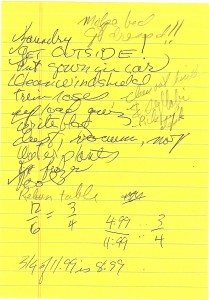
One thing that’s fast becoming clear: when your time is unstructured, lists have their uses. Now that I’ve attained Bumhood, it’s amazing how fast time goes by without much getting done!
In the past, long before Mary Kay Ash started teaching her acolytes to scribble their entrepreneurial tasks in lipstick on the bathroom mirror, I used to write to-do lists every day. In my first job as a publication editor, I would end each day by making a list of the following day’s tasks and leave it on my desk, thereby jump-starting the next day. This pretty much guaranteed the work got done by deadline. Something about checking off accomplishments, no matter how minor, builds momentum.
Lately, though, I’ve found myself killing too much time in cruising the Web and not enough time living, so I decided to revive the list habit, at least in a sporadic way.
Yesterday this quirk gave a hint of its potential power.
Apparently I ate something that made me sick—it left me under the weather all day. I really didn’t feel like doing much. But I had a list. Even though I was dragging around, when the day ended I realized I’d done a surprising number of tasks. Didn’t get out for a long walk with the dog or spend time loafing at the fancy shopping center where Cassie likes to hold forth as the center of everyone’s attention. Never got back to pruning and fertilizing roses. But…
• Did the laundry
• Chlorinated the pool
• Reset the pool equipment
• Watered a few plants
• Wrote a blog post
• Updated Excel spreadsheets
• Set up online bill paying for the S-corp’s Visa card
• Paid the Visa bill online
• Paid the Cox bill online
• Wrote & posted three online quizzes for this spring’s students
• Learned how to use a new feature of BlackBoard, the online teaching software
• Posted syllabi
• Emptied out the binder I use as my mobile “office” for the community colleges
• Used heavy card stock to build new dividers, all printed out and nifty
• Organized binder to accommodate three new classes
• Started decluttering the stuffed file cabinet in the garage
• Cleaned the car windshield again, it not having turned out to be quite pristine the last time I washed the car
• Took the dog for a walk…sort of.
Doubt if I’d have done any of those without a list of things to check off. Think of all the stuff that would’ve gotten done if I’d felt like moving!
You can, I think, get carried away with this strategy. When I was a little kid, a playmate’s parents used to stick a daily list on his bedroom wall—it filled an 8 1/2 x 11 sheet of paper and specified what he would be doing each moment of the day. Literally: they put down when he would brush his teeth and when he would go from the bathroom back to his bedroom to get dressed and when he would appear in the kitchen for breakfast. Poor little guy…can you imagine having your life regimented like that?
It’s not necessary to map out every living, breathing minute to use listing to jump-start your day. Often a rough list of ideas for things to do will get you going, so that once you’re started, you end up accomplishing a great deal more than you would have without the check-it-off impetus. Sometimes I’ll retroactively add to the list activities that I got sidetracked into doing and check them off, just to congratulate myself for getting something done that day. Yesterday, for example, though I never did make the bed, change out of my grubbies, trim the roses, or clean house, I did add things that didn’t require me to move far from the computer: uploaded syllabi as well as quizzes, cleaned last semester’s junk out of the teaching binder and organized it for next semester, and shoveled off the top of my desk.
Next:


